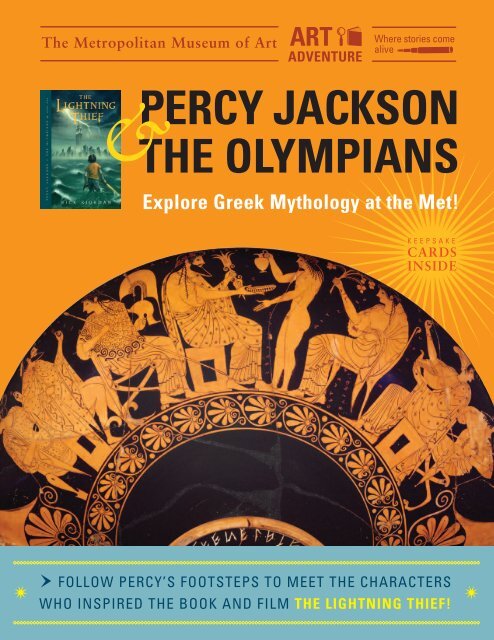Percy Jackson The olymPians - The Metropolitan Museum of Art
Percy Jackson The olymPians - The Metropolitan Museum of Art
Percy Jackson The olymPians - The Metropolitan Museum of Art
Create successful ePaper yourself
Turn your PDF publications into a flip-book with our unique Google optimized e-Paper software.
1“What you may not know is that...the forces youcall the Greek gods...are very much alive.”...“Zeus,” I said. “Hera, Apollo. You mean them.”And there it was again—distant thunder on acloudless day. “Young man,” said Mr. D,“I would really be less casual about throwingthose names around, if I were you.”Speaking <strong>of</strong> the gods, can you name all nine divine characterswho are painted around the outside <strong>of</strong> this kylix?Did you know? Kylix means drinking cup. When this cupis empty, a surprise is revealed. Can you find it?2...threedays after I’d arrived at Camp Half-Blood,I had my first sword-fighting lesson...We startedwith basic stabbing and slashing, using somestraw-stuffed dummies in Greek armor.Suit up for your adventures in our galleries. Don’t worry,you won’t have to wear 70 pounds <strong>of</strong> armor as the Greekfoot soldiers did.Did you know? Cuirass [pron. kwi-RAHS] comes fromcorium, the Latin word for skin or leather.5“Iknow you journey to Hades’s realm,” she said.“Few mortals have ever done this and survived:Orpheus, who had great music skill; Hercules,who had great strength; Houdini, who couldescape even the depths <strong>of</strong> Tartarus. Do you havethese talents?”Here is another one wrapped in fur. His first Labor was to fetchthe skin <strong>of</strong> the Nemean lion. Can you see the lion’s head here?Did you know? Hercules’s father was Zeus and his motherwas Alcmena, a mortal.6“...You’rethe woman who spoke to me in theMississippi River.” “Yes, child. I am a Nereid,a spirit <strong>of</strong> the sea. It was not easy to appear s<strong>of</strong>ar upriver, but the naiads, my freshwatercousins, helped sustain my life force...”<strong>The</strong>re is a love story here. Find the one-eyed man who gazesupon his adored one, the Nereid Galatea.Did you know? Polyphemus was a Cyclops, a member<strong>of</strong> a race <strong>of</strong> savage one-eyed giants.
ARMORGreek<strong>Art</strong> ZEUS Greek<strong>Art</strong>Zeus (Roman: Jupiter) King <strong>of</strong> the Olympian gods.His symbols include an eagle, shield, and thunderbolt.Cuirass Historical armor, <strong>of</strong>ten with breast andback plates fastened together. Soldiers were outfittedwith a helmet, cuirass, shield, spear, sword, andgreaves to protect the shins.Gallery 155. Cuirass (body armor), Greek, Apulian, 4th century b.c.; bronze;Gift <strong>of</strong> Estée Lauder Inc., 1992 (1992.180.3)HERA (Roman: Juno) Wife <strong>of</strong> Zeus. She was theprotector <strong>of</strong> marriage, childbirth, and the home.APOLLO Greek god <strong>of</strong> light, prophecy and healing,and poetry and music.Gallery 153. Kylix (drinking cup), Greek, Attic, red-figure, ca. 515–510 b.c.;terracotta; Tarquinia, Museo Nazionale RC6848; Lent by the Republic <strong>of</strong> Italy,2008 (L.2008.1.1)NEREID Roman<strong>Art</strong>HERCULES Roman<strong>Art</strong>Nereid [pron. NEER-ee-id] A sea nymph, attendant<strong>of</strong> Neptune, <strong>of</strong>ten depicted reclining on the back<strong>of</strong> a dolphin or mythical sea monster.Polyphemus A one-eyed giant who loved thesea nymph Galatea. He was later blinded by Odysseus(Roman: Ulysses).Gallery 166. Landscape with Polyphemus and Galatea: From the “MythologicalRoom” <strong>of</strong> the Imperial Villa at Boscotrecase, Roman, Augustan, last decade <strong>of</strong> 1stcentury b.c.; wall painting, fresco; Rogers Fund, 1920 (20.192.17)HERCULES (Greek: Herakles) A great hero who hadto complete twelve missions (Labors). <strong>The</strong> last involvedhis descent to the underworld to bring back the threeheadeddog Cerberus.Gallery 162. Statue <strong>of</strong> a bearded Hercules, Roman, Flavian period, A.D. 68–98; marble;Gift <strong>of</strong> Mrs. Frederick F. Thompson, 1903 (03.12.14)
3Glancingback, I got my first clear look at themonster...His neck was a mass <strong>of</strong> muscle andfur leading up to his enormous head...As if oncue, the bull-man bellowed in rage.4Iran through D names from Greek mythology.Wine. <strong>The</strong> skin <strong>of</strong> a tiger. <strong>The</strong> satyrs that allseemed to work here...“You’re Dionysos,”I said. “<strong>The</strong> god <strong>of</strong> wine.”Can you find the Minotaur? Seven young men and womenwere sacrificed to this scary beast each year before <strong>The</strong>seusaccepted the challenge to kill him.Did you know? Stone c<strong>of</strong>fins were called sarcophagi,meaning “flesh-eaters.”Five heads are better than one. Can you find them all carvedin this statue?Did you know? Dionysos had many attributes. This statueshows three: an ivy wreath, s<strong>of</strong>t laced boots, and a feline skin.7Annabethnodded. “Your father isn’t dead, <strong>Percy</strong>.He’s one <strong>of</strong> the Olympians.”...“Who’s your mom,then?”...Annabeth straightened. “Athena.Goddess <strong>of</strong> wisdom and battle.”8Icould see Aunty Em’s dark reflection in theorange glass; her headdress was gone, revealingher face as a shimmering pale circle. Her hairwas moving, writhing like serpents.Speaking <strong>of</strong> battles, what objects link Athena to Perseus’sslaying <strong>of</strong> Medusa? Can you find a representation <strong>of</strong>Medusa’s head?Did you know? Athena armed Perseus for battle againstthe Gorgon, Medusa.Perseus needed the gods’ help to kill the evil Medusa.With Athena’s advice, he got a cap <strong>of</strong> invisibility; Hermes’ssandals gave Perseus the ability to fly.Did you know? Anyone who looked at Medusa’s facewas instantly turned to stone.
DIONYSoS Roman<strong>Art</strong>MINOTAUR Roman<strong>Art</strong>Minotaur Half-bull, half-human who lived in theLabyrinth; killed by <strong>The</strong>seus.DIONYSoS (Roman: Bacchus) Greek god <strong>of</strong> wine.<strong>The</strong>ater festivals and athletic competitions were heldin his honor. He rescued Ariadne from the island<strong>of</strong> Naxos.Gallery 162. Statue <strong>of</strong> Dionysos leaning on a female figure (“Hope Dionysos”), Roman,Augustan or Julio-Claudian, 27 B.C.– A.D. 68; restored by Vincenzo Pacetti; Roman copy <strong>of</strong> Greekoriginal; marble; Gift <strong>of</strong> <strong>The</strong> Frederick W. Richmond Foundation, Judy and Michael Steinhardt,and Mr. and Mrs. A. Alfred Taubman, 1990 (1990.247)In the galleries, you’ll notice that Dionysos has his missing nose. This is a restoration.<strong>The</strong>seus Son <strong>of</strong> Poseidon; famous for defeatingthe Minotaur <strong>of</strong> Crete.Ariadne Daughter <strong>of</strong> King Minos <strong>of</strong> Crete. She helped<strong>The</strong>seus escape after he killed the Minotaur. She wasrescued by Dionysos after <strong>The</strong>seus abandoned her.Gallery 162. Sarcophagus with garlands and the myth <strong>of</strong> <strong>The</strong>seus and Ariadne,Roman, Hadrianic or early Antonine, ca. A.D. 130–150; marble, Luni and Pentelic;Purchase by subscription, 1890 (90.12a,b)PERSEUS EuropeanSculptureATHENAEuropeanSculpturePERSEUS A celebrated Greek hero. His father was Zeusand his mother Danaë was a mortal princess. Perseuskilled the Gorgon Medusa.Medusa A female monster, one <strong>of</strong> the three Gorgonsisters.Gallery 548. Antonio Canova (Italian [Rome], 1757–1822), Perseus with the Head<strong>of</strong> Medusa, 1804–6; marble; Fletcher Fund, 1967 (67.110.1)ATHENA (Roman: Minerva) Goddess <strong>of</strong> wisdom, war, andthe arts. She is depicted fully armed, and the owl is hersymbol. Sometimes she holds an olive branch and shield.Gallery 552. Claude Michel, called Clodion (French, 1738–1814), Minerva (Athena),1766; terracotta; Purchase, Charles Ulrick and Josephine Bay Foundation Inc. Gift, 1975(1975.312.6)


